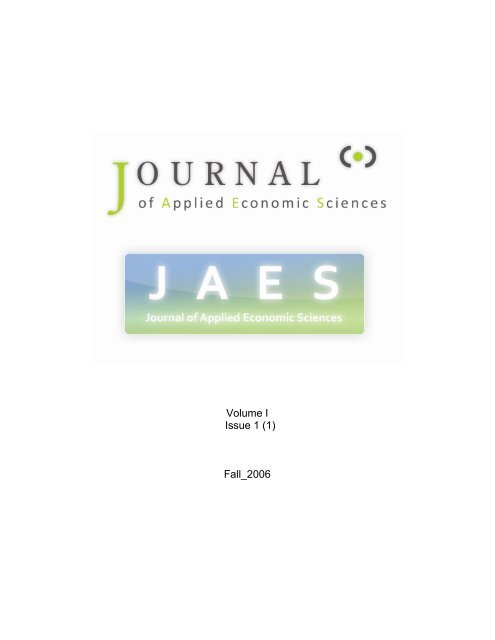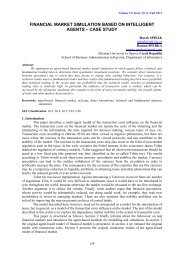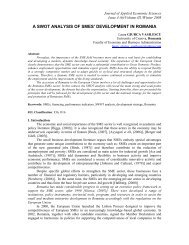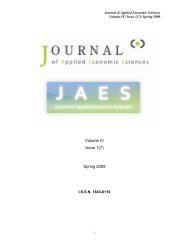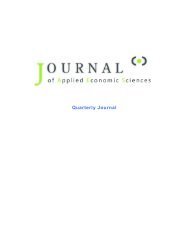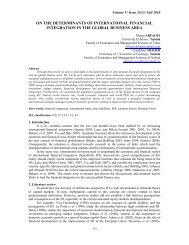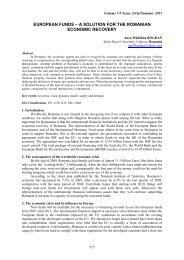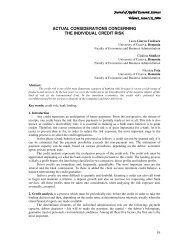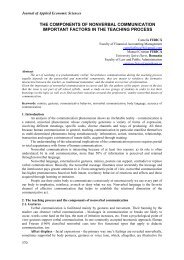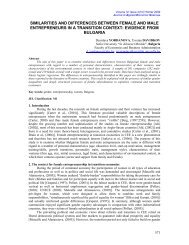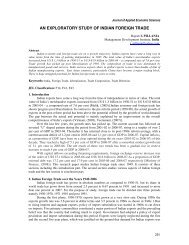Volume I Issue 1 - JAES | Journal of Applied Economic Sciences
Volume I Issue 1 - JAES | Journal of Applied Economic Sciences
Volume I Issue 1 - JAES | Journal of Applied Economic Sciences
You also want an ePaper? Increase the reach of your titles
YUMPU automatically turns print PDFs into web optimized ePapers that Google loves.
<strong>Volume</strong> I<br />
<strong>Issue</strong> 1 (1)<br />
Fall_2006
<strong>Journal</strong> <strong>of</strong> <strong>Applied</strong> <strong>Economic</strong> <strong>Sciences</strong><br />
<strong>Volume</strong>I_<strong>Issue</strong>1 (1)_2006<br />
JOURNAL OF APPLIED ECONOMIC SCIENCES<br />
JOURNAL OF APPLIED ECONOMIC SCIENCE is a young economics and<br />
interdisciplinary research journal, aimed to publish articles and papers that should contribute<br />
to the development <strong>of</strong> both the theory and practice in the field <strong>of</strong> economic sciences.<br />
The journal seeks to promote the best papers and researches in management, finance,<br />
accounting, marketing, informatics, decision/making theory, mathematical modelling, expert<br />
systems, decision system support, and knowledge representation. This topic may include the<br />
fields indicated above but are not limited to these.<br />
<strong>Journal</strong> <strong>of</strong> <strong>Applied</strong> <strong>Economic</strong> <strong>Sciences</strong> be appeals for experienced and junior<br />
researchers, who are interested in one or more <strong>of</strong> the diverse areas covered by the journal. It is<br />
currently published quarterly with three general issues in Winter, Spring, Summer and a<br />
special one, in Fall.<br />
The special issue contains papers selected from the International Conference organized by<br />
the European Research Centre <strong>of</strong> Managerial Studies in Business Administration and<br />
Faculty <strong>of</strong> Financial Management Accounting Craiova in each October <strong>of</strong> every academic<br />
year. There will prevail the papers containing case studies as well as those papers which bring<br />
something new in the field. The selection will be made achieved by:<br />
Conference Session Chairs<br />
Editorial Board Members<br />
The journal will be available on/line and will be also be distributed to several<br />
universities, research institutes and libraries in Romania and abroad. To subscribe to this<br />
journal and receive the on-line/printed version, please send a request directly to<br />
jaes_secretary@yahoo.com
<strong>Journal</strong> <strong>of</strong> <strong>Applied</strong> <strong>Economic</strong> <strong>Sciences</strong><br />
<strong>Volume</strong>I_<strong>Issue</strong>1 (1)_2006<br />
Editorial Board<br />
Editor in Chief<br />
Laura Ştefănescu<br />
Managing Editor<br />
Mădălina Constantinescu<br />
Executive Editor<br />
Mihaela Galiceanu<br />
Pro<strong>of</strong> – readers<br />
Camelia Firică - English<br />
Petrişor Militaru - English<br />
Mihaela Popescu - French<br />
Redactors<br />
Cristiana Bogdănoiu<br />
Sorin Dincă<br />
Editorial Advisory Board<br />
Christoph Barmeyer, Universite Robert Schuman, France<br />
Gheorghe Bică, Spiru Haret University, Romania<br />
Ana Bobîrcă, Academy <strong>of</strong> <strong>Economic</strong> Science, Romania<br />
Ion Gâf-Deac, Spiru Haret University, Romania<br />
Eugen GhiorghiŃă, Spiru Haret University, Romania<br />
Ion Viorel Matei, Spiru Haret University, Romania<br />
Constantin Mecu, Spiru Haret University, Romania<br />
Peter Sturm, Institut National de Recherche en Informatique et Automatique, France<br />
Andy Ştefănescu, University <strong>of</strong> Craiova, Romania<br />
Laura Ungureanu, Spiru Haret University, Romania<br />
Spiru Haret University<br />
Faculty <strong>of</strong> Financial Management Accounting Craiova<br />
European Research Center <strong>of</strong> Managerial Studies in Business Administration<br />
Brazda lui Novac Street, no 4 Craiova, Dolj, Romania<br />
Phone: +40 251 598265 Fax : + 40 251 598265<br />
Email: jaes_secretary@yahoo.com<br />
Web: www.jaes.reprograph.ro
<strong>Journal</strong> <strong>of</strong> <strong>Applied</strong> <strong>Economic</strong> <strong>Sciences</strong><br />
ISSN 1843-6110<br />
Table <strong>of</strong> Contents<br />
<strong>Journal</strong> <strong>of</strong> <strong>Applied</strong> <strong>Economic</strong> <strong>Sciences</strong><br />
<strong>Volume</strong>I_<strong>Issue</strong>1 (1)_2006<br />
Dorel BERCEANU, Dan Florentin SICHIGEA<br />
Determination <strong>of</strong> Company Value by the Approach Based on Assets … 9<br />
Valeriu BRABETE, Cristian DRĂGAN<br />
Considerations concerning the Role <strong>of</strong> Accounting as Informational System and<br />
Assistance <strong>of</strong> Decision … 14<br />
Laura GIURCĂ VASILESCU, Cătălina SITNIKOV, Nicoleta FOTA<br />
Actual Considerations Concerning the Individual Credit Risk … 19<br />
Ion Viorel MATEI<br />
The Implications <strong>of</strong> the Commercial Transactions through Settling Up<br />
in the Conditions <strong>of</strong> International <strong>Economic</strong>al Globalization … 24<br />
Ion POPESCU, Aurelian BONDREA, Marin COMŞA<br />
Durable Development and Global Evolutions ... 29<br />
Ion POPESCU, Aurelian BONDREA, Mădălina CONSTANTINESCU<br />
The Change – An Imperative Request for the Durable or Sustainable Development … 41<br />
Simona ROTARU, Mirela GHITA, Sorin DINCĂ<br />
Use <strong>of</strong> an Informational System for Modelling and Simulation concerning<br />
the Prognosis <strong>of</strong> Electric Power … 55<br />
Nicolae SICHIGEA, Dan Florentin SICHIGEA<br />
Company Evaluation using the Discounted Net Cash Flow Method ... 61<br />
Victor ŞTEFAN, LaurenŃiu DRAGOMIR<br />
Doctrinaire Archetypes <strong>of</strong> Macroeconomic Politics ... 67<br />
Laura ŞTEFĂNESCU<br />
Concrete Aspects concerning the System Analysis in Decision Assistance<br />
for the Management <strong>of</strong> a Portfolio <strong>of</strong> Derivate Financial Products … 70
<strong>Journal</strong> <strong>of</strong> <strong>Applied</strong> <strong>Economic</strong> <strong>Sciences</strong><br />
<strong>Volume</strong>I_<strong>Issue</strong>1 (1)_2006<br />
DETERMINATION OF COMPANY VALUE BY THE APPROACH<br />
BASED ON ASSETS<br />
Dorel Berceanu, Dan Florentin Sichigea<br />
University <strong>of</strong> Craiova, Romania<br />
Faculty <strong>of</strong> <strong>Economic</strong>s and Business Administration<br />
Abstract:<br />
This paper treats method based on assets <strong>of</strong> valuation <strong>of</strong> firm. So, after short theoretical considerations<br />
about this method we presented a practical study <strong>of</strong> valuation for a leasing firm. The method based on assets,<br />
also known as patrimonial method, the method based on costs and the method based on replacement costs,<br />
consists in correcting (adjusting) the book values <strong>of</strong> individual assets and company debts to convert them in<br />
market values.In this assessment, the company is mistaken with its assets, namely with the net asset, the valuator<br />
considering it as disjoined, respectively as an amount <strong>of</strong> assets.<br />
Key words: company value; method based on assets; patrimonial value.<br />
CONSIDERATIONS CONCERNING THE ROLE OF ACCOUNTING AS<br />
INFORMATIONAL SYSTEM AND ASSISTANCE OF DECISION<br />
Valeriu Brabete, Cristian Drăgan<br />
University <strong>of</strong> Craiova, Romania<br />
Faculty <strong>of</strong> <strong>Economic</strong>s and Business Administration<br />
Abstract:<br />
The accreditation <strong>of</strong> accounting as scientific discipline is far from being achieved. In our attempt to<br />
establish the status <strong>of</strong> accounting as a science, we have used the current understanding <strong>of</strong> the term, and the<br />
contemporary perspectives on know-ledge in general.<br />
Key works: information system and assistance <strong>of</strong> decision; accounting; accounting as measurement<br />
system; accounting as information system; accounting as instrument for social intermediation<br />
ACTUAL CONSIDERATIONS CONCERNING<br />
THE INDIVIDUAL CREDIT RISK<br />
Laura Giurca Vasilescu, Cătălina Sitnikov, Nicoleta Fota<br />
University <strong>of</strong> Craiova, Romania<br />
Faculty <strong>of</strong> <strong>Economic</strong>s and Business Administration<br />
Abstract:<br />
The credit risk is one <strong>of</strong> the most dangerous category <strong>of</strong> banking risks because it covers a wide range <strong>of</strong><br />
products and services. In the last years we were the witnesses to an intensification <strong>of</strong> the negative impact <strong>of</strong> this<br />
kind <strong>of</strong> risk at the international level. In the transition economies, the credit risk’s potential was<br />
overdimensioned by the various evolutions <strong>of</strong> the companies and their debt level.<br />
Key words: credit risk; bank lending;
<strong>Journal</strong> <strong>of</strong> <strong>Applied</strong> <strong>Economic</strong> <strong>Sciences</strong><br />
<strong>Volume</strong>I_<strong>Issue</strong>1 (1)_2006<br />
DURABLE DEVELOPMENT AND GLOBAL EVOLUTIONS<br />
Ion Popescu, Aurelian Bondrea, Marin Comşa<br />
Spiru Haret University, Romania<br />
Abstract: The academic and scientific world, in solidarity becoming emblematic, it was and remains sensible<br />
to social, economic and moral challenges, making generous efforts for finding reasonable and appropriate<br />
solutions, capable to release the stress <strong>of</strong> conflicting state <strong>of</strong> facts until it is not too late. So, after a long period<br />
<strong>of</strong> time it analyzed major problems as: unemployment, inflation, interests, external debts, competition,<br />
international working division and budgetary deficits, aspects concerning the theory and economic practice, for<br />
which classical explorations provided satisfactory answers, now there is the time for ultimate questions, one<br />
more awkward than the other.<br />
Key words: durable development; resources; environment;<br />
THE CHANGE – AN IMPERATIVE REQUEST FOR THE<br />
DURABLE OR SUSTAINABLE DEVELOPMENT<br />
Ion Popescu, Aurelian Bondrea, Mădălina Constantinescu<br />
Spiru Haret University, Romania<br />
constantinescu_madalina2002@yahoo.co.uk<br />
Abstract:<br />
A credible hypothesis suggests that, in the future the economic growth will not be anymore a general and<br />
continuous one, and that the economic agents known from the special literature under the conventional name as<br />
organization or company (a group <strong>of</strong> persons acting conscious and coordinated in order to achieve common<br />
objectives), shall survive only if they make sustaining and continuous efforts to assimilate, in due time, the “last<br />
moment” technologies, including the ones referring to the organization and management <strong>of</strong> the performed<br />
activity. In this respect the plea in favor <strong>of</strong> the performance and elaboration <strong>of</strong> provisions or prognosis, as a<br />
premise <strong>of</strong> durable development, becomes legitimate and credible, contributing to the resolution <strong>of</strong> problems<br />
claimed by the general progress.<br />
Starting with XXI st century, the chance <strong>of</strong> survival <strong>of</strong> the economic and financial-banking units is<br />
proportional with the value <strong>of</strong> the management action, demarche known in the special literature as strategic<br />
management or management <strong>of</strong> change. But in order to be a successful one, the management must be creative,<br />
<strong>of</strong> prospective type and, as much as possible, non-conflictive.<br />
Key words: change, durable development; economic growth, management <strong>of</strong> change;<br />
USE OF AN INFORMATIONAL SYSTEM FOR MODELING AND<br />
SIMULATION CONCERNING THE PROGNOSIS<br />
OF ELECTRIC POWER<br />
Simona Rotaru<br />
simona_rotaru_ro@yahoo.com<br />
Mirela GhiŃă<br />
mire_ghita@yahoo.com<br />
Sorin Dincă<br />
sorin.dinca@gmail.com<br />
Spiru Haret University, Romania<br />
Faculty <strong>of</strong> Management Financial Accounting, Craiova<br />
Abstract:<br />
The management <strong>of</strong> the electric power process in modern hydroelectric power plants implicate the<br />
intense use <strong>of</strong> the information technology, both for the activities performed in actual time and also for the ones<br />
performed outside the actual time.<br />
Now, when discussing about the problem concerning the development <strong>of</strong> hydroelectric potential, in the<br />
same time with the optimization <strong>of</strong> production process, it is necessary to assist the manufacturer’s decision in
<strong>Journal</strong> <strong>of</strong> <strong>Applied</strong> <strong>Economic</strong> <strong>Sciences</strong><br />
<strong>Volume</strong>I_<strong>Issue</strong>1 (1)_2006<br />
choosing those production capacities able to cover the electric power consume which has important variations<br />
in time.<br />
Concerning the production <strong>of</strong> electric power, its defining particularity that it can not be deposited, also<br />
imposes that the prognosis <strong>of</strong> electric power to be as precise as possible. Using an advanced informational<br />
system instrument for parametric modeling and simulation concerning the electric power can also be made<br />
scenarios and prognosis having an error <strong>of</strong> 3% instead <strong>of</strong> 5%, in the present, being place at the upper limit <strong>of</strong><br />
the admissible safety concerning the operation <strong>of</strong> the national energetic system.<br />
Key words: production optimization, parametric modeling, production prognosis, web application<br />
DOCTRINAIRE ARCHIETYPES OF MACROECONOMIC POLITICS<br />
Victor Ştefan, LaurenŃiu Dragomir<br />
University <strong>of</strong> Craiova, Romania<br />
Faculty <strong>of</strong> <strong>Economic</strong>s and Business Administration<br />
Abstract:<br />
In modern and democratic society conditions, which is characterized by a multitude <strong>of</strong> economic<br />
doctrines, as a reflection <strong>of</strong> the multitude <strong>of</strong> parties system that exists, economic policies are directed and<br />
appreciated in comparison with the main doctrinaire currents in social and economic life. But, solving social<br />
and economic problems can't <strong>of</strong>fer the expected results by using only the economic policies generated by the<br />
classical and neo-classical theories thus being necessary the emerging and development <strong>of</strong> some new theories.<br />
Keywords: macroeconomic policy; doctrinaire archietype; economic doctrine; liberalism; neoliberalism;<br />
democratic socialism; Marxist socialism;<br />
CONCRETE ASPECTS CONCERNING THE SYSTEM ANALYSIS IN<br />
DECISION ASSISTANCE FOR THE MANAGEMENT OF A<br />
PORTFOLIO OF DERIVATE FINANCIAL PRODUCTS<br />
Laura ŞTEFĂNESCU<br />
Spiru Haret University, Romania<br />
Faculty <strong>of</strong> Management Financial Accounting, Craiova<br />
laurastef73@yahoo.com<br />
Abstract:<br />
A successful projection <strong>of</strong> a decision assisting system supposes a good formulation and understanding <strong>of</strong><br />
the problem, emphasizing the organization’s informational needs. This understanding can lead to a clear<br />
differentiation between the system analysis (“what has to be done?”) and system projection (“how it must be<br />
done?”).<br />
The paper makes a complex study over the activities and informational fluxes usually run by the<br />
management activity in order to establish the general requests which shall be provided by means <strong>of</strong> an<br />
information system for decision assistance for the management portfolio.<br />
Key words: decisional model, model <strong>of</strong> objects, classes <strong>of</strong> objects, association <strong>of</strong> relations


